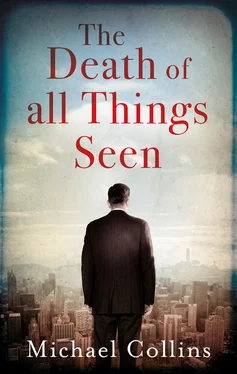On these occasions Helen had always found comfort, hearing the raspy scratch of Mr Feldman’s five o’clock growth on the end of the receiver, and so, too, the clink of china plates being gathered from the impressive spread of tables, the general hubbub of corporate entitlement which made her feel all was well, that everything which mattered in the world was in the capable hands of irreproachable men of sound character and good moral judgment. She would never, ever have thought Mr Theodore Feldman would have bowed out, stepping from his corporate office window atop the Chicago skyline on the Black Monday of 1987, but he did.
That was when her life had most surely ended, or so said Norman in the years afterward, implying improprieties of a most sordid sort, pressing against her loyalty and fond remembrance of Mr Feldman with his general cynicism of all things past, the accusations surfacing at being left in the nurse’s office because she simply could not leave work. ‘It was as simple as that, Norman!’
She heard herself shout it inside her head.
*
Helen felt the dull ache of her insides. Shouldn’t she turn now and head toward Dr Marchant, face the coming realities? And yet she didn’t, circling again her former life, passing the burnished brass revolving door of her old office building, casting back to a time before Mr Feldman’s suicide, re-aligning life again, finding her way to earlier memories.
She tried to find that essential old happiness, to inhabit an early freedom as a newly liberated woman of the late sixties. She had such fond memories, rising in the morning in a hustle to get Norman to the school bus on time, leaving the utilitarian suburb of a modest house in a car financed on affordable down payments for the throng on the commuter train platform. She remembered it all with absolute clarity, parking her car amidst the gleam of other new cars, proceeding in the push of life, venturing toward the stenciled ceiling and frescos beyond the revolving door of her office building.
Even now, she could see in her mind’s eye the gold-leafed topaz and onyx tiffany mosaic in the building’s lobby, the entire pageant of Midwestern history captured in a series of stylized mosaics, the collective first landings rendered in a two-dimensional flatness suggesting an uncomplicated arrangement of bringing a Christian God to the natives — a sharing of gifts between frocked French missionaries, Bibles in hand, with olive-skinned natives in ceremonial headdress offering a peace pipe at some appointed canoe portage.
No matter the real history. She could almost hear Norman in her head shouting, and she wanted to scream back at him, for who now didn’t know the true history!
‘Yes, Norman, the ravages of smallpox and measles, the internment of natives and the Trail of Tears… I know … I know … you are so damned right…’
And yet in the mosaics’ audacious simplicity, set before the people as artifact, it had served as a stylized myth of life as a system of exchanges, of deals, where the only underlying principle was the decorum and manner of how one negotiated.
It was in these early first landings, these ceremonial exchanges, that the glory of a new world was founded — from a humble barter of animal pelts to the glorious reach of skyscrapers in a span of mere centuries.
No single history could account for such progress. It was all too vastly complicated, and yet so manifestly real and literal, the inner chamber of the lobby a crypt holding the sacred transactional truth of Adam Smith’s Wealth of Nations . It had all come together so beautifully once-upon-a-time, the perfect inning, the improbable no-hitter of American dominance, and all of it coinciding with her youth.
*
Helen turned east on Jackson toward the lake in the evening traffic, intent now on what needed to be done. Snow had threatened all afternoon. It fell now in drifting flakes of a snow globe. This was the contained reality of her life, or how it had once been. It had passed.
In retirement, for the better part of a decade, she had huddled in a housecoat in her basement inhabiting a remote history of distant lives and times, re-enactments on the Discovery Channel — entire eras and civilizations compressed into hour shows — the Crusades and the Dark Ages, the spectre of plague and famine, the rise and fall of the Roman Empire, and on through the plundering conquests of the Norse, Vikings, and Vandals, all of it a tumbling distraction of dates and events. This had been the sarcophagus of her hours, days, weeks, and years.
She thought of Cancer as blithely unaware of her absence; Cancer, taking in a mid-morning Western before getting up to torment her in the toilet in late-morning agony, the cloud of blood in the bowl after she went. She imagined Cancer, slovenly, up-to-date. A reaper in a college hoodie and sweatpants, shuffling out of the den; Cancer standing in the grey light leading up to the first floor; Cancer whining for her, in the way Norman had over the years. It sent a shudder through her.
*
It was tempting just to close her eyes, to end it here. She circled the block of her former life. It was all there, arrested and contained, so like she remembered it. She wanted to pull over, park her miserable Toyota import, go stand again in the mosaic lobby and feel the overpowering reassurance of her own existence.
She passed the gleam of her office building once more. Why had she come down here? When she got the news of her illness, her first thought had landed on Mr Feldman, that she might yet meet him again on the other side of life.
What did such thoughts say about her? Had Norman been right in his accusations? Such questions, and in the lateness of life! No! She wouldn’t answer them! She would not.
She sniffled. She wanted to go deeper, find that place within herself where it all still existed, the time before her illness, before that godforsaken 9/11, before the accumulation of joys and regrets that had somehow, quietly, rubbed out her significance.
It was decided. The choice had always been hers. She felt a control she had not felt in a long time. Yes, that most surely was it, why she had come here one last time: to reclaim the feelings of those years of comfort in what had been back then, the incalculability of life in an emerging modern world of options, where she had continued to work after marriage, and even after Norman’s birth, the surrogate infrastructure of daycare overseen by attentive professionals in child psychology, all vastly more equipped to nurture growth than any mother sequestered with a child and a TV in the doldrums of the mid-afternoon soaps.
How forward-looking it had all seemed. How liberating! The delegation of tasks per one’s merits, one’s interests, the uncompromising vision that everyone could have everything one needed, or at least the opportunity to seek it. And now it was gone.
Helen felt her eyes tear, intent on what needed to be done. On the seat beside her lay a letter from the State Attorney’s Office, a subpoena requiring her testimony in a case she had thought long closed, now reopened, alleging Walter’s criminal obstruction of justice in perjuring himself by providing an alibi for two officers accused of executing two gangland dealers who had been set to testify against members of Chicago’s South Side vice unit.
She was sobbing, her thoughts settled on Norman, on his Angry Man show, on the quiet indictment of a fiction that might yet be appraised as fact, as evidence. What would he say about her and about Walter, about their lives? Helen ran the back of her hand under her nose, tasting her own tears, drifting in the blurred flow of traffic against the falling snow. The subpoena was already a week old. It had been served to her door, which she had obstinately refused to open despite the persistence of the serving officer. She had not yet formally acknowledged its receipt, not even against the stiff formality of the follow up messages left on her answering machine.
Читать дальше












